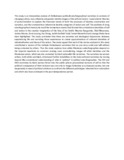Please use this identifier to cite or link to this item:
https://cris.library.msu.ac.zw//handle/11408/1097| Title: | Contesting narratives: constructions of the self and the nation in Zimbabwean political auto/biography | Authors: | Javangwe, Tasiyana D. | Keywords: | Political autobiography, Representation, Self identitySocial constructionism, Imagined community, Marginality | Issue Date: | Nov-2011 | Abstract: | This study is an interpretive analysis of Zimbabwean political auto/biographical narratives in contexts of changing culture, race, ethnicity and gender identity images of the self and nation. I used eclectic theories of postcolonialism to explore the fractured nature of both the processes of identity construction and narration, and the contradictions inherent in identity categories of nation and self. The problem of using autobiographical memory to recall the momentous events that formed the contradictory identities of self and nation in the creative imagination of the lives of Ian Smith, Maurice Nyagumbo, Abel Muzorewa, Joshua Nkomo, Doris Lessing, Fay Chung, Judith Garfield Todd, Tendai Westerhof and Lutanga Shaba have been highlighted. The study concluded that there are narrative and ideological disjunctures between experiencing life and narrating those experiences to create approximations of coherent identities of individual selves and those of the nation. The study argued that each of the stories analyzed in this study contributed a version of the multiple Zimbabwean narratives that no one story could ever tell without being contested by others. Thus the study explores how white Rhodesian auto/biographies depend on the imperial repertoire to construct varying, even contradicting, images of white identities and the Rhodesian nation, which are also contested by black nationalist life narratives. The narratives by women writers, both white and black, introduced further instabilities to the male authored narratives by moving beyond the conventional understanding of what is ‘political’ in political auto/biographies. The HIV and AIDS narratives by black women thrust into the public sphere personalized versions of self so that the political consequence of their inclusion was not only to image Zimbabwe as a diseased society, but one desperately in need of political solutions to confront the different pathologies inherited from colonialism and which also have continued in the post-independence period | URI: | http://hdl.handle.net/11408/1097 |
| Appears in Collections: | Thesis |
Files in This Item:
| File | Description | Size | Format | |
|---|---|---|---|---|
| Contesting narratives.pdf | Abstract | 24.17 kB | Adobe PDF |  View/Open |
Page view(s)
128
checked on Apr 27, 2025
Download(s)
24
checked on Apr 27, 2025
Google ScholarTM
Check
Items in MSUIR are protected by copyright, with all rights reserved, unless otherwise indicated.



